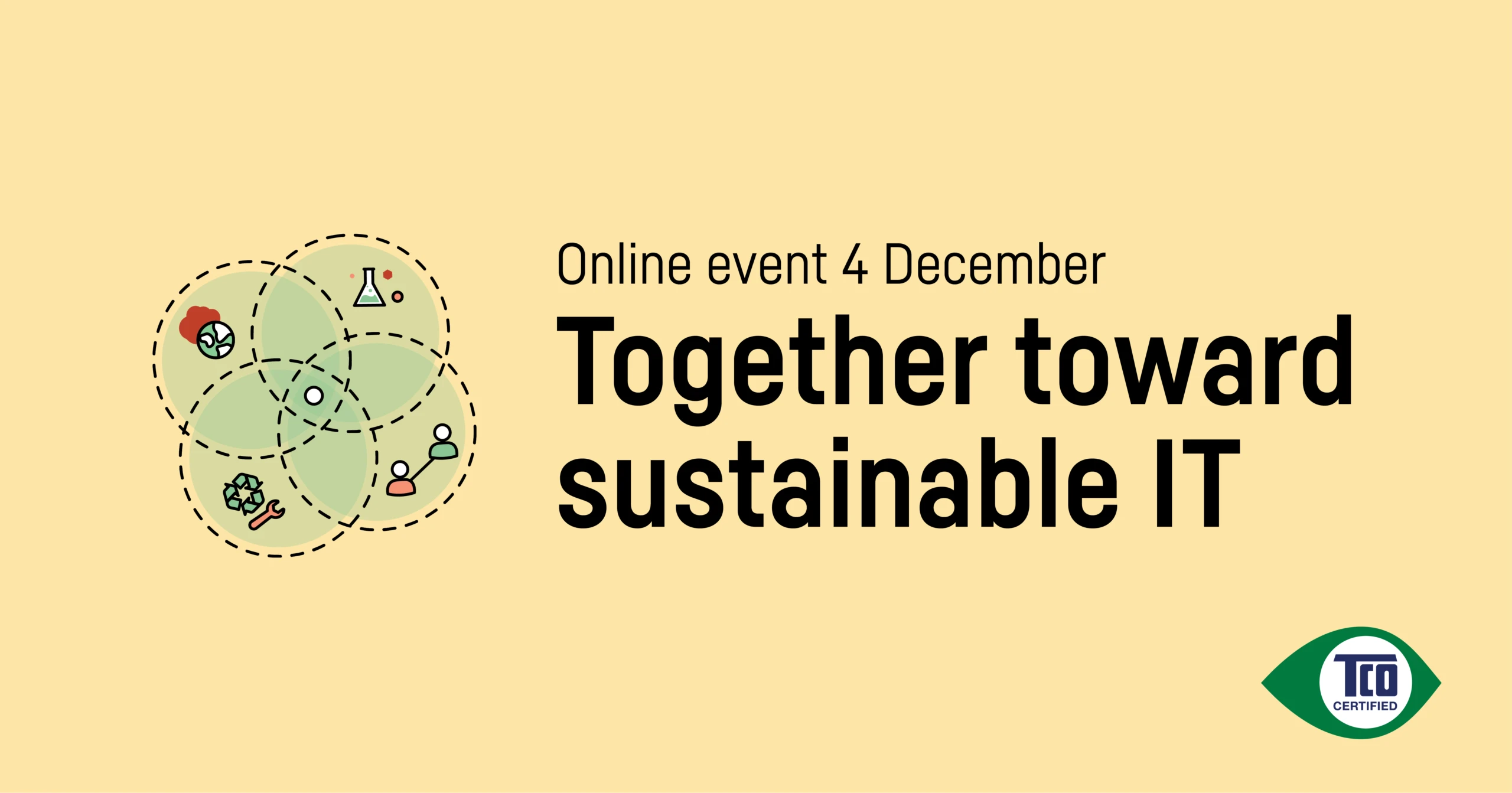More than audits and a code of conduct are needed to drive social sustainability in the complex IT supply chain. Stephen Fuller and Niclas Rydell explain the importance of building a structured system for continuous improvements, where independent verification, follow-up, incentives and accountability play important parts.
TCO Certified includes comprehensive environmental and social criteria in the supply chain and throughout the product life cycle. All criteria are mandatory, and compliance is independently verified by accredited experts.
What’s the most important factor for driving social sustainability?
Stephen: Almost every time a social audit is performed at a factory, non-conformities are discovered. The most important issue, in our opinion, is that these are resolved in a fast and credible way. This process is weak or lacking in many other systems, including the societal and legal systems in many of the countries where IT products are manufactured. When the government and society do not take enough responsibility for human and worker rights, other systems must be put in place to ensure fair and safe working conditions.
Finding sustainability issues is only the first step on the way to more sustainable practices. We ensure progress by holding the industry accountable for also solving the issues.
How do you follow up on social criteria in factories?
Stephen: Every final assembly factory of certified products must be registered to TCO Certified Portal and be included on TCO Certified Accepted Factory List. The factories are divided into risk categories. Those that are proactive in their work with sustainability and continuously meet the criteria in TCO Certified are placed in a low-risk category (category 2 and 3), while factories with persisting sustainability issues receive a higher risk category (category 1). If major issues are not corrected within a set timeframe, the factory is removed from TCO Certified Accepted Factory List and is no longer allowed to manufacture certified products.
Every factory must submit an RBA-VAP or SA8000 audit within the first 12 months of being registered. These audit types are the most serious ones and the only ones that are accepted as proof. They cover the whole factory and are conducted by approved independent auditors. After the first initial audit and closure audit, the frequency of audits vary depending on the factory’s risk level, which is determined by how well its management system identifies and resolves priority and major findings. High-risk factories must do initial audits annually. A high-risk factory (category 1) presently has a maximum of 24 months to improve its risk setting to either category 2 or 3. Otherwise, the factory is removed from TCO Certified Accepted Factory List and is restricted from manufacturing certified products.
In addition to requiring independent audits, we assign an accepted factory audit service provider to conduct spot-check audits on a selection of factories annually. These types of audits cover a selection of factories that are category 2 or 3, situated in high-risk countries. Category 2 and 3 are chosen since category 1 factories are already noted as being at higher risk and are subject to yearly auditing. We focus spot checks on verifying if category 2 and 3 factories can keep their category. A level of continual monitoring like this is necessary so that even low-risk factories know they must take continual improvement seriously and do not relax their management systems by falling back into bad practices.

Stephen Fuller leads the development of supply chain and chemical management criteria for TCO Certified. He has worked with criteria development and verification methods in the IT sector for over 20 years.
TCO Certified Accepted Factory List increases transparency, which is essential for improvement, accountability, collaboration and fair competition. IT product brand owners can view the latest audit findings and corrective action progress, and choose to locate production of their products at a factory that is at the forefront of sustainability. This is groundbreaking: sustainability is now good business for factory owners. More ambitious factories get more business, which is an incentive for factory management to prioritize sustainability issues.
At the moment (June 2023), we have 78 final assembly factories registered, of which 23 are category 1, 22 are category 2, and 33 are category 3. We are currently assessing 10 of these to be included in a spot-check audit during 2023, that covers labor rights, health and safety and process chemicals.
How do you make sure that products and factories continue to meet the criteria in TCO Certified also after the certificate is issued?
Niclas: As long as a product is certified, it is covered by TCO Certified’s system for independent verification and follow-up and we will ensure that the product and the factories where it is made meet the criteria in TCO Certified. Verification is mandatory and continuous — it is carried out both before and after certification, throughout the certificate’s validity period. This means we will do spot checks and ensure that any non-conformity is handled responsibly. We give a strict timeline for solving found issues, and if the corrective actions are not implemented swiftly, we will cancel the certificate and inform all stakeholders about this.
The certification status of a product model can easily be found in our Product Finder, a searchable registry for all certified product models. The best way to ensure that a product model is certified is to ask the IT supplier to provide a valid TCO Certified certificate. The certificate serves as proof of compliance that can be traced back to an independent verifier’s signature.

Niclas Rydell is the director of TCO Certified. He leads the team that ensures that the certification continues to push sustainability where it matters most by launching a new set of criteria and verification methods every three years.
A purchaser who uses TCO Certified does not need to have the knowledge or the resources to check compliance with set criteria during the validity of the certificate. This reduces risk and cost for the purchasing organization.
For expired or withdrawn certificates
TCO Development will not be involved in solving any environmental or social issues related to the manufacturing or the product. We have no legal right to do so after the certificate has expired.
How do you address the issue of living wages?
Stephen: To achieve a basic level to live on, workers can be forced into a situation where they must agree to work excessive overtime since working within local legal limits does not enable them to earn a decent wage to live on. Brand owners have said it’s not always possible to set wages at the supplier level since it must be available for all workers at the supplier factory and not only dedicated to their brand production lines. Therefore, many brand owners consider they can only support collective negotiations between workers and their employers.
We work in the following ways to improve workers’ wage levels:
- We enforce a 60-hour workweek limit for all workers at the factory. Limiting the amount of overtime available means the factory management will need to raise the basic wage levels to allow workers to achieve their monthly wage target, otherwise they may lose their workforce.
- We incentivize factories to become SA8000 certified by giving them category 3 benefits if they do so. The SA8000 certification scheme only awards certificates to companies paying the living wage, and certified factories are monitored by its independent surveillance program regularly. We have seen a huge transition to becoming SA8000 certified since we started risk-categorizing factories and presenting them on TCO Certified Accepted Factory List.
- Our annual review process guides brand owners in establishing a living wage process for their suppliers. Their progress is independently reviewed by a verifier annually.
How do you keep workers safer from chemical exposure?
Stephen: We require that the factory is ISO 45001 certified. This is the international standard for health and safety in the workplace. Workers must be provided with the correct personal protective equipment and training for the chemicals they are handling. Proper ventilation must be provided and chemicals must be taken care of in a responsible way.
We also require that all process chemicals used to clean certified products are assessed by an independent toxicologist and benchmarked as a safer alternative before being used in the manufacture of certified products. Since 2015, TCO Certified has incorporated the use of GreenScreen to provide a structured approach to evaluating human health and environmental safety data for various chemical substances. Once a substance is assessed in accordance with these risks, the GreenScreen methodology assigns it to one of five possible benchmarks based on the level of concern. For compliance with TCO Certified, a chemical substance included in a certified product must achieve a GreenScreen score of Benchmark 2, 3, or 4. These safer alternatives are listed on TCO Certified Accepted Substance List. Benchmark 1 is defined as a chemical of high concern and must be avoided. Benchmark-U means the minimum data requirements aren’t fulfilled in order to make an assessment.
With TCO Certified Accepted Substance List, we aim to create more transparency, promote safer substances, and eliminate the use of substances with unknown or known hazardous properties in IT products. The list includes the official registered CAS numbers so anyone can challenge the benchmarks with new information. All substances on the list have been reviewed, and an independent Licensed GreenScreen Profilers sets the benchmark score.




